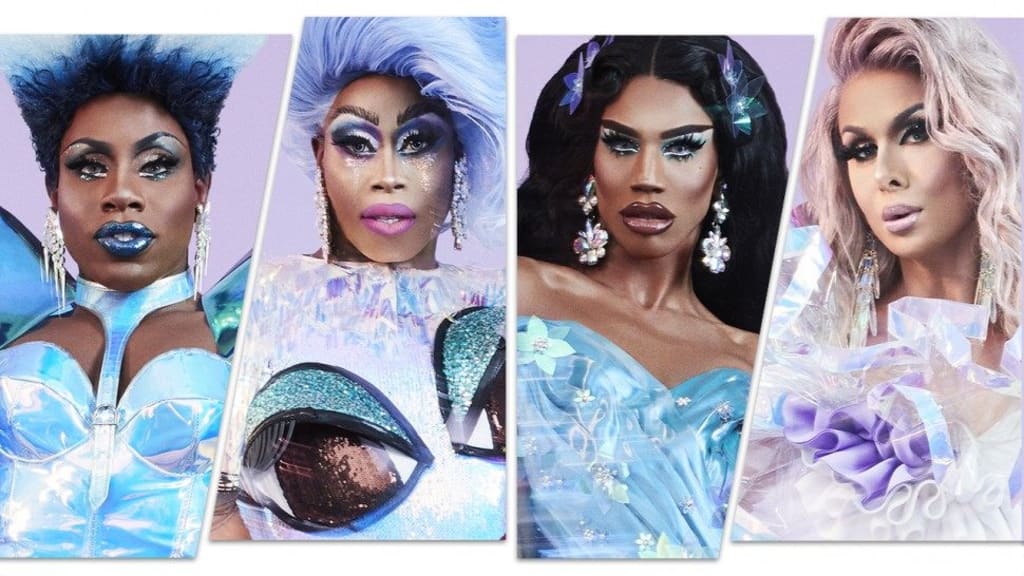
A lot has been said about the racism in the fanbase of RuPaul's Drag Race. Queens have spoken out against racist abuse from the fans, and spoken out against the racism within the shows practises. But I feel like conversations need to become focused and really hold the show (and by proxy, RuPaul) accountable for its treatment of black people, and black culture.
As of publishing this post, only three out of ten queens who have won the show (not counting the All Stars seasons) are black. The OG winner bebe Zahara Benet, the now infamous Tyra Sanchez, and the comedic powerhouse, Bob the Drag Queen. Bebe's drag draws influence from her Cameroonian culture and a winner like this for the first season would theoretically set a precedent for a show that embraces and celebrates blackness in all its forms. Earlier seasons did have challenges based on black cultural icons and figures. Season one had a challenge based on the mononymous, Oprah, and based on Destiny's Child. However, these celebrations of black icons took a different form in later seasons. Instead, we had challenges like the Empire pastiche Rucoco's Empire, and the 90s hip hop flavoured, Oh No She Better Don't. Don't get me wrong, I very much enjoyed Rucoco's Empire (let's not talk about the other one I mentioned), but something felt off. Leaning into stereotypes connected to the black experience left a bad taste in my mouth because it had been so long since the show's challenges had embraced black cultural figures in the same way that it embraced white ones. Lady Gaga, Cher, and Judy Garland (to name a few) have all had runways or challenges based on them that celebrated what made them so special. Whether it was entire musicals dedicated to their stories, runways based on their outfits, or some combination of the two, white icons seem to have been prioritised while black cultural icons are seemingly ignored. (Or their contributions are diluted because of a tenuous link between Judy Garland and a certain cultural milestone that rhymes with Bone Ball Biots.) The times black figures have been portrayed in later seasons of Drag Race have been in the VH1 Divas Live challenge (Mariah Carey, Patti LaBelle, Diana Ross and Janet Jackson) and in various snatch game characters (that are chosen for the most part by the contestants). However, these characters are mainly portrayed by black queens possibly because of the need to look like the figures that they are portraying.
The issue here seems to be in the way that the show itself frames black culture. The contributions of black people in performance, in general and to the culture around drag seem to be ignored, which is somewhat disappointing to me as a black viewer of the show. It surprises me that there has been no runway inspired by Whitney Houston, or Grace Jones or even Diana Ross, No RuHollywood Stories about the story of Destiny's Child, and no Lipsynch Extravaganza based on "Lemonade" (to put a few wishes out into the universe). My disappointment does not come from a place of wanting to angrily critique the show.
It comes from wanting the show to do more of the good that the show already does when it comes to representation. On the finale episode of All Stars 4, Monique Heart spoke to Monet X Change about the idea of the top two being two black drag queens and what that would mean for young black queer youth to potentially see themselves celebrated on such a platform. Imagine if that representation was integrated into the challenges and runways of the shows as well. Referencing films, artists, musicians and moments of black culture in a show that is (currently) hosted by a black drag queen would be another level of representing blackness in a more celebratory light than the show currently does.
Not only would I find this to be personally satisfying I feel like it would be a good approach to the Drag Race Brand, showing solidarity to the black contestants on the show. The same contestants are often victims of double standards, and racist abuse by the fans of the show. If the show were to say, "I see black culture, and celebrate black culture" in the form of integrating it into the bones of the show, then I imagine the same racist fans wouldn't feel as emboldened to express their own racism on public platforms. Black queens could potentially feel like the machine of drag race is more on their side in these instances. Ideally, the racist fans would just stop being racist but let's be honest, that won't happen any time soon.
As season 11 is starting VERY soon, I'm hoping that some of the things I've mentioned here do come into play as Drag Race takes more steps to celebrate blackness, and not leave black excellence behind.
Love, peace and hair grease,
Joash!
P.S Please feel free to leave a tip and support the efforts of a budding writer!
About the Creator
Jo' Ash
A British Musical Theatre Person™ who loves and writes about identity, the arts, and popular culture sometimes all at once!
Follow me!
Twitter @Joashaha
Instagram @Joashhh






Comments
There are no comments for this story
Be the first to respond and start the conversation.